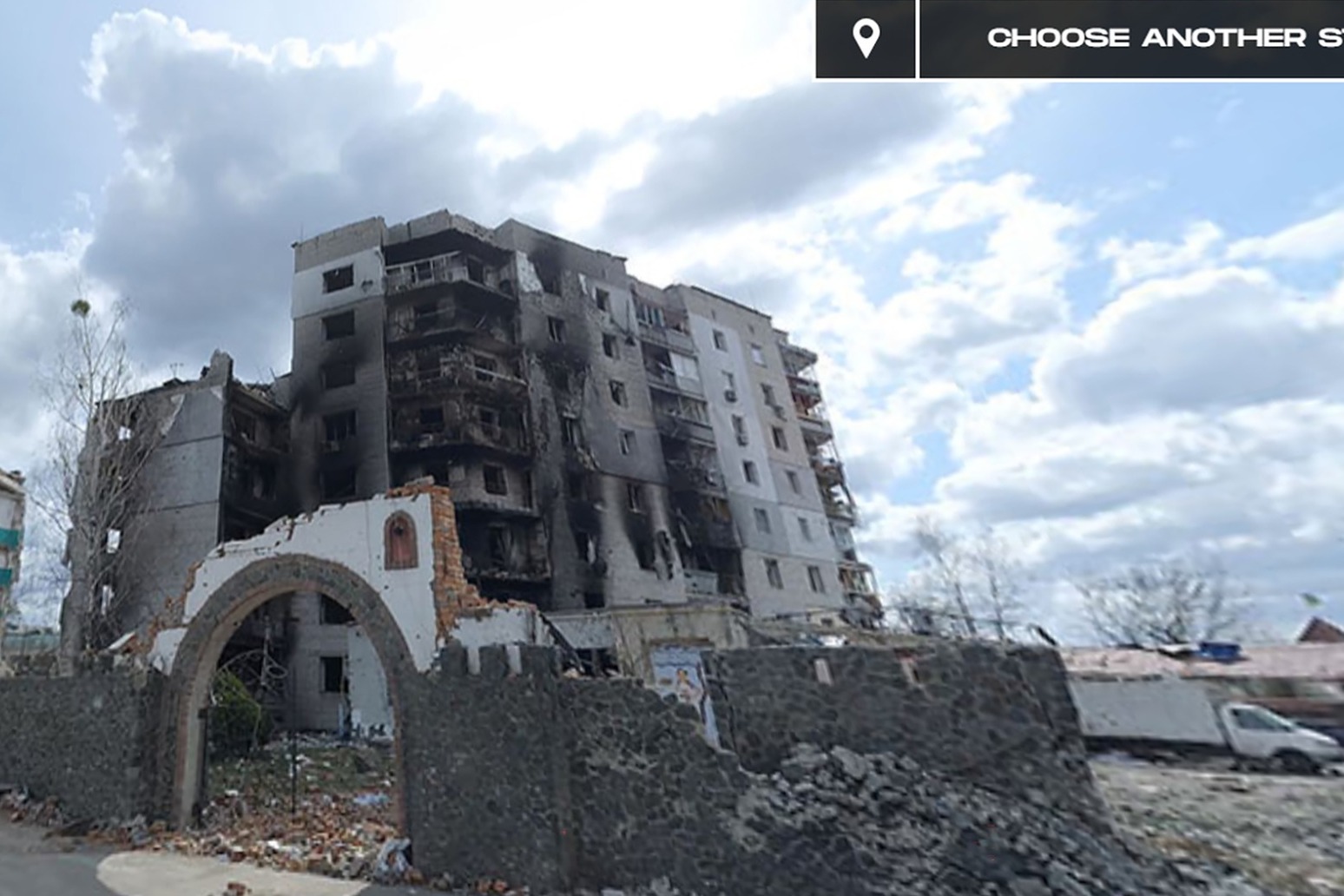
The site, called ‘Undeniable Street View’, allows people to compare views before and after Russia’s invasion
A Ukrainian photographer has contributed to a website which allows people to immersively walk the war-torn streets of his country and compare them before and after the Russian invasion, in the hope it will highlight the “terrible” reality of the destruction caused.
The Undeniable Street View was launched on the one-year anniversary of Russia launching a full-scale invasion of Ukraine – February 24 – and is the first war zone presented in Street View and made from more than 100km of raw Street View footage.
It has been shot by Ukrainian photography experts on the ground, including Mykola Omelchenko, whose project called War Up Close played a pivotal role in The Undeniable Street View’s existence.
War Up Close shows people the extent of the continued destruction in Ukraine through 360 degree images, virtual tours and global exhibits and was made with Discover.ua and FreegenGroup.
Mr Omelchenko – who specialises in 360 degree photography and became the first Ukrainian certified Google photographer in 2016 – said that the idea behind War Up Close came about as a means of showing the true destruction caused by Russia’s invasion of Ukraine.
“When the war started, the pictures that we started to see of the war in the news and on Telegram channels were depressive and scary,” the 47-year-old, who lives in Kyiv, told the PA news agency.
“But then Russia started to say that (Ukrainians) were bombing their own cities, which is a complete lie.
“And to fight that propaganda, we decided to fight behind the cameras.”
Images Mr Omelchenko and other Ukrainian photographers took of Ukrainian cities using Titan 11k 360-degree cameras and drones were used on The Undeniable Street View.
Viewers can immersively walk the streets of six Ukrainian cities including Kyiv, Irpin, Kharkiv, Izyum, Chernihiv and Sumy, with a feature allowing people to compare the cities before and after the invasion.
Mr Omelchenko said that Irpin and Borodyanka are “probably the most destroyed” areas, from those he filmed in.
“I know those villages – I have travelled through them a lot for business and pleasure – and to see the destruction was terrible. I was devastated,” he said.
“I thought after filming in the Kyiv region I was ready for many things, but when I went to Kharkiv – there’s a region called Saltivka, which is on the east border – it was even more terrible because there was nothing else left but schools and apartments.”
The team are so focused on showing “proof” of damage caused in their country, even if they are risking their lives by doing so.
“This is our own equipment, our own cards, our own lives,” Mr Omelchenko said.
“No-one’s going to pay us back if a missile hits the car, destroys the drone or 360 cameras.”
He also spoke about the pain he has felt photographing the country during the ongoing war.
“Before the war I was part of many projects – I photographed the old castles of Ukraine, the national parks, so I know how beautiful Ukraine is.
“And for me to see the destruction was very painful. I think this experience will stay with me for the rest of my life.
Mr Omelchenko added that “behind every destroyed apartment or house, there is also a story”.
“We were flying drones in one area to see what the damage was and a little girl – around five years old – came to us and said, ‘Are you going to bomb us today?’” he said.
“(Another time), a person came out of their completely destroyed house and he asked what we were doing and when he found this information out, he brought us plums.
“How can you take those plums when you find out that person does not have anything? What can we give him back?
“He said, ‘I just want you to show the world what the Russians have done to us’.
“Stories like that put scars on my heart.”
The war has also had a profound impact on his feeling of safety and security, even when he is travelling to other countries for work.
“Every time I hear a noise, I still duck,” he said.
“I still look around to see what it is because my mind is still in Ukraine and understands that there’s a war and a missile can go off anywhere.”
He added that everyday life is a mix of running to shelters, regularly checking in on family when electricity permits and sleeping with layers of clothes on.
“My (14-year-old) son right now can distinguish between the different missiles, this is not the information I want him to know.”
Mr Omelchenko added that sharing War Up Close with others through exhibitions in countries including Poland, Germany, France and America has led to many crying or having tears in their eyes.
“They did not realise how damaging the war is and how close the war is.
“When they immersively saw and walked on the streets via a phone or Oculus, it made a change to their reality and lives.
“We need to keep the world engaged, as if Ukraine loses, who’s next?”
Mr Omelchenko has plans to film in other cities when they are safer and filming permission is granted.
The Undeniable Street View was formed in partnership with and in support of a collective of Ukrainian organisations, including United24, Voices of Children, Nova Ukraine and Vostok-SOS, and can be found at: www.theundeniablestreetview.com
More information about War Up Close can be found here: https://war.city/about/
Published: by Radio NewsHub







